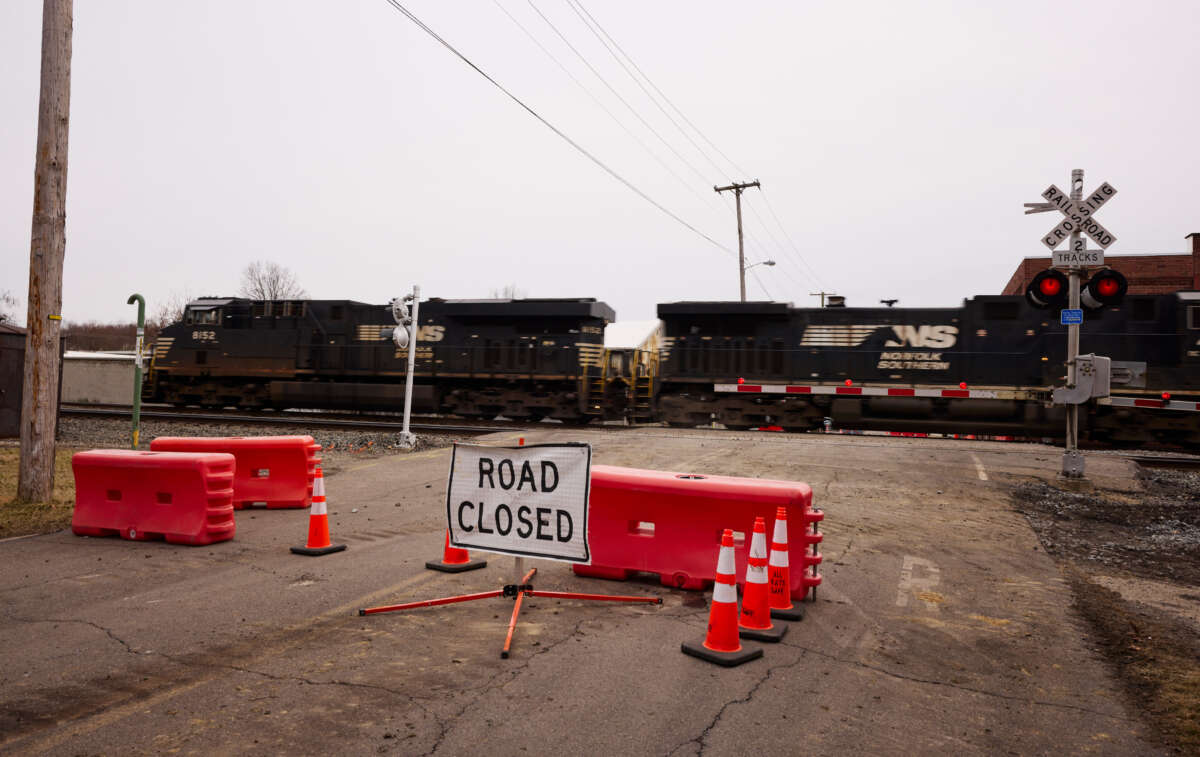Facing intense scrutiny and backlash over the toxic derailment of one of its trains in eastern Ohio, Norfolk Southern on Wednesday reached a deal with a leading rail union to provide up to a week of paid sick leave per year to around 3,000 track maintenance workers.
Under the agreement, Norfolk Southern will immediately give four workdays of paid sick leave annually to maintenance employees who previously had none, an industry-wide outrage that nearly led to a national rail strike late last year.
The deal will also allow employees to “utilize up to a maximum of three paid personal leave days per year as paid sick leave.”
Tony Cardwell, president of the Brotherhood of Maintenance of Way Employes Division (BMWED), said in a statement that “after 45 years of fighting for this issue, the carrier and union have accomplished what is needed for those who contribute the most to railroad profits, the workers on the ballast line.”
Speaking to Freight Waves, BMWED media representative Clark Ballew stressed that while the paid sick leave agreement is “a good development in an industry that is in dire need of positive momentum,” it is “not the end” of workers’ fight for basic quality-of-life benefits.
“Our members are tasked with rebuilding the track of the [East] Palestine derailment and it is imperative that they have resources available that keep them safe and healthy at a site that many would be apprehensive to work,” Ballew said. “Paid sick time is one of those resources, but there are several others, and we expect NS to start doing right by their employees and the public and afford all resources necessary to not exacerbate an already bad situation.”
Norfolk Southern, which has around 19,000 employees total, is the third Class 1 railroad in the past month to agree to provide paid sick leave to some of its workers after aggressively fighting unions’ demands for years, including during recent White House-brokered negotiations that produced a contract with zero paid sick days.
Congress voted in December to impose the contract on workers after unions representing a majority of U.S. rail employees rejected it and threatened to strike.
The sick leave deal comes as Norfolk Southern is under mounting pressure after one of its trains crashed and spewed hazardous chemicals earlier this month in the small town of East Palestine, Ohio.
“Norfolk Southern must be in the midst of some bad publicity for it to sign an agreement with around 3,000 unionized maintenance-of-way workers for seven paid sick days,” responded The American Prospect’s David Dayen.
The East Palestine wreck, its toxic aftermath, and Norfolk Southern’s handling of the clean-up process spurred a close examination of the company’s efforts in recent years to kill safety rules that could have prevented or mitigated the impacts of the derailment. The company, along with other rail giants, has persistently lobbied both Republicans and Democrats, successfully beating back attempts to upgrade train braking systems and more strictly regulate freight cars carrying hazardous materials.
“Amid the lobbying blitz against stronger transportation safety regulations, Norfolk Southern paid executives millions and spent billions on stock buybacks—all while the company shed thousands of employees despite warnings that understaffing is intensifying safety risks,” The Lever reported earlier this month. “Norfolk Southern officials also fought off a shareholder initiative that could have required company executives to ‘assess, review, and mitigate risks of hazardous material transportation.'”
Our most important fundraising appeal of the year
December is the most critical time of year for Truthout, because our nonprofit news is funded almost entirely by individual donations from readers like you. So before you navigate away, we ask that you take just a second to support Truthout with a tax-deductible donation.
This year is a little different. We are up against a far-reaching, wide-scale attack on press freedom coming from the Trump administration. 2025 was a year of frightening censorship, news industry corporate consolidation, and worsening financial conditions for progressive nonprofits across the board.
We can only resist Trump’s agenda by cultivating a strong base of support. The right-wing mediasphere is funded comfortably by billionaire owners and venture capitalist philanthropists. At Truthout, we have you.
We’ve set an ambitious target for our year-end campaign — a goal of $150,000 to keep up our fight against authoritarianism in 2026. Please take a meaningful action in this fight: make a one-time or monthly donation to Truthout before December 31. If you have the means, please dig deep.
